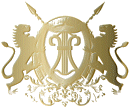
聖樹聖獣文様
西洋の芸術(中世)
ケンタウロスの図像
![]() 以下の本は1913年の刊でパブリックドメインなので
以下の本は1913年の刊でパブリックドメインなので
図像を見てみます(アーサー・H・コリンズ「英国教会に現された動物と鳥のシンボリズム」)
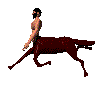
アーサー・H・コリンズ
「英国教会に現された動物と鳥のシンボリズム」
https://bestiary.ca/etexts/collins1913/.pdf
SYMBOLISM
OF
ANIMALS AND BIRDS
REPRESENTED IN ENGLISH
CHURCH ARCHITECTURE(英国教会に現された動物と鳥のシンボリズム)
BY
ARTHUR H. COLLINS, M.A. NEW YORK
McBRIDE, NAST & COMPANY
1913
IX. The Basilisk Or Cockatrice And Centaur(p.35 )
In Greek classics the centaur is a creature compounded half
of a man and half of a horse.
It was descended from Ixion and
Nephele, and symbolic of all forms of sensuality(好色).
Virgil in his
Æneid writes of centaurs at the gates of hell.
Dante places them
in the Inferno.
He describes them as armed with darts, with
which they shoot at violent men who are condemned to be in a
river of boiling blood.
When Isaiah in xiii. 21 says that satyrs or he-goats (Revised
Version, margin) shall dance in the desolation of Babylon, he
was interpreted by mediÊval zoologists as meaning the centaur.
The sagittarius(いて座,人馬宮), or centaur, with bow and arrow, is one of the
signs of the Zodiac.
One of the principal stories told about the centaur or
sagittarius is that it makes war upon certain savage men in the
deserts of India.
These savages have a horn in the middle of
their foreheads, and are naked, except when one of them has
killed a lion, then he will wear the skin. They live in trees on
account of their many enemies.
The war between the sagittarius and the savage man (野蛮人)is symbolic of the war between the spirit and the flesh.
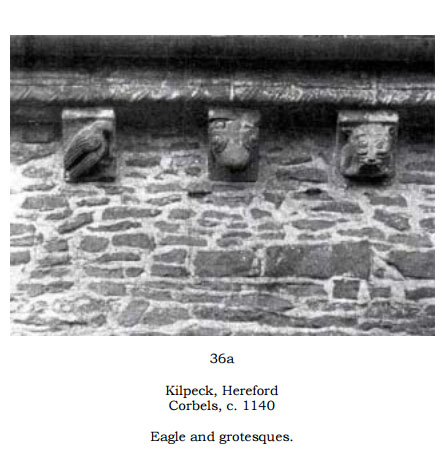
The savage who lives in the trees signifies the peaceable Christian who loves His Creator, and when he fights with the lion he signifies the man who battles with the flesh and overcomes.
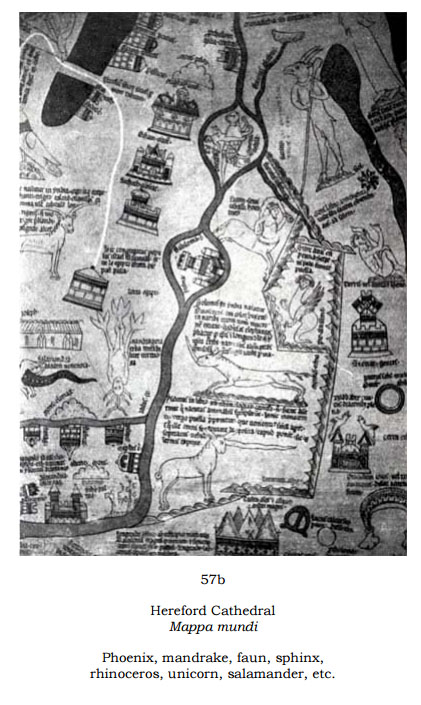
In the Hereford mappa mundi we see a bearded centaur holding a snake in his arms, which presumably he has destroyed.
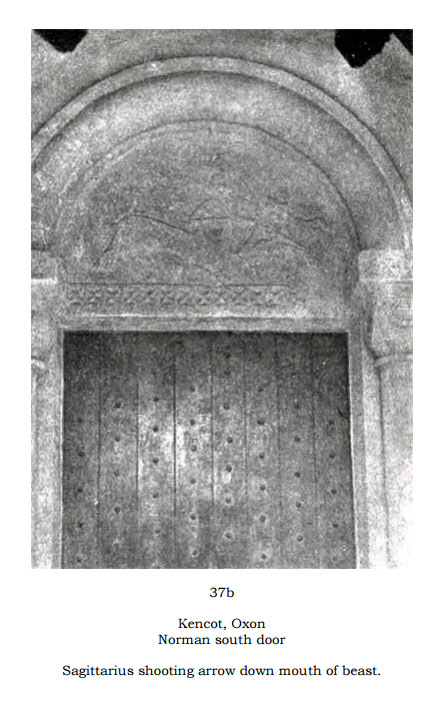
The inscription is ìFauni semicaballi homines.” On the Norman tympanum at Kencott, Oxon, the centaur is shooting an arrow into the mouth of a huge dragon-like beast, of which only the head is seen. This example is inscribed Sagittarius.
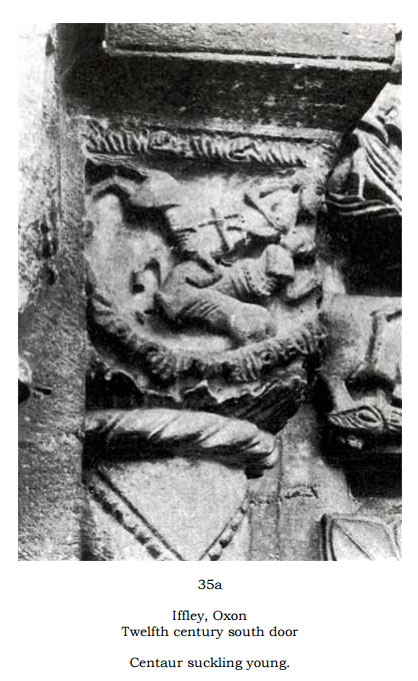
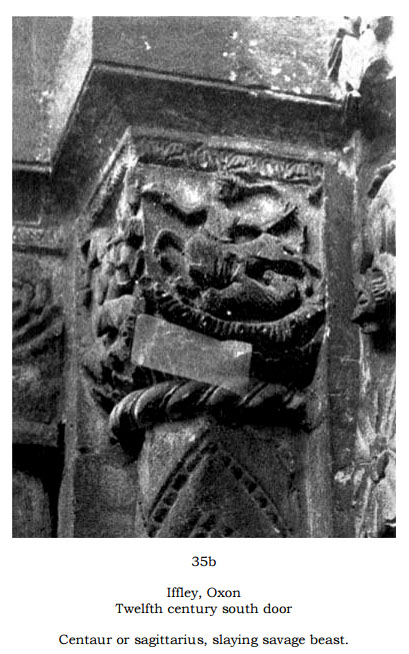
At Iffley a sagittarius tramples on a lion it has killed; and another, a female, is shown suckling its young. Both these are on the late Norman south door.
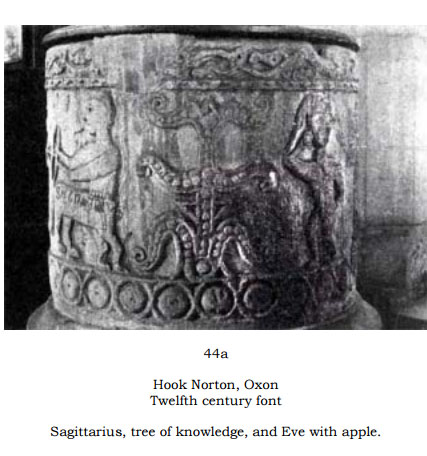
On the font at Hook Norton, Oxon, the sagittarius is depicted driving Adam and Eve out of the Garden of Eden. This also is inscribed like the tympanum at Kencott.
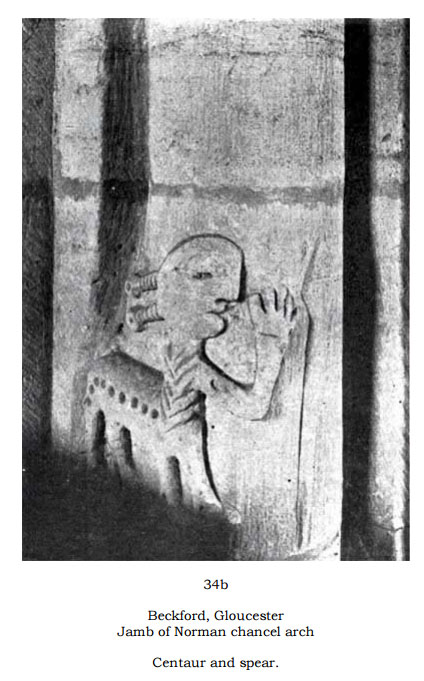
At West Rounton, on the Norman font a sagittarius is shooting a man at short range, while on the Norman font at Luppitt, Devon, a centaur with spear and foliated tail can be made out. We illustrate two very interesting examples of the Centaur from Gloucestershire. On a jamb of the Norman chancel arch at Beckford he can be seen with a spear upright in front of him. His hand is upraised, and he has a spotted body and curiously dressed hair.
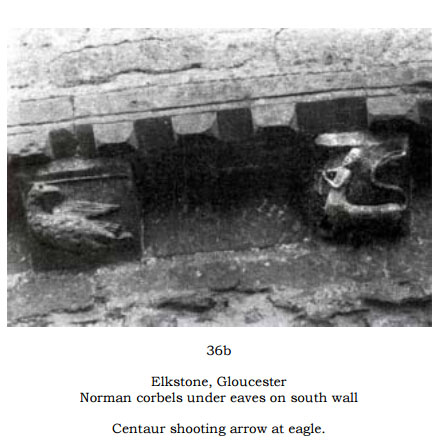
Under the eaves of Elkstone a Sagittarius has just discharged his arrow at, and missed, an eagle. These two corbels are obviously connected; though any such connection is the exception rather than the rule.
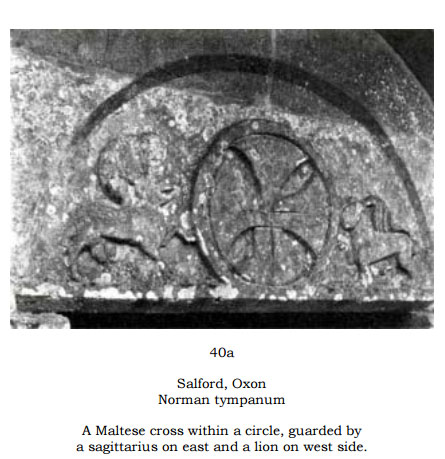
Mr. Francis Bond mentions that the centaurís prey, the savage man or ìwoodhouse,î is represented together with lions round the pedestals of East Anglian fonts.
On the pedestal of the fine fifteenth century font of Saxmundham he is a hairy savage with a club, and he stands next to a lion. On the top of this font are angels bearing the symbols of the Passion, alternately with the evangelistic symbols, but no sign is to be seen of a centaur.
■ケンタウロスの図像(アーサー・H・コリンズ「英国教会に現された動物と鳥のシンボリズム」)⇒centaurus1.html
■ ケンタウロスの図像(ルクレール・マルクス) ⇒J-L-Marx.html
■ケンタウロのケイローン(名を持つケンタウロス)⇒chiron.html
■The sagittarius(いて座,人馬宮) , or centaur, with bow and arrow, is one of the signs of the Zodiac. ⇒sagittarius.html
■「ケンタウロス」 に戻る


